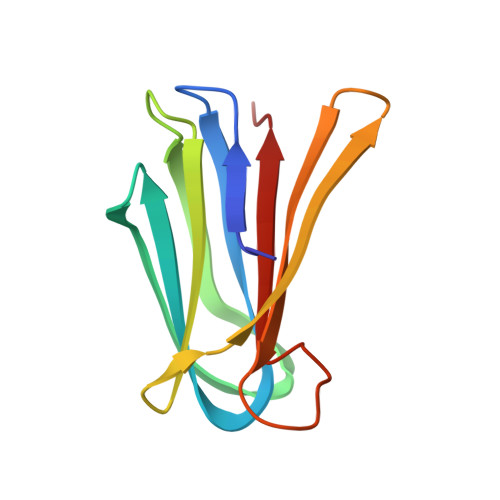Inhibition and dispersion of Pseudomonas aeruginosa biofilms by glycopeptide dendrimers targeting the fucose-specific lectin LecB.
Johansson, E.M., Crusz, S.A., Kolomiets, E., Buts, L., Kadam, R.U., Cacciarini, M., Bartels, K.M., Diggle, S.P., Camara, M., Williams, P., Loris, R., Nativi, C., Rosenau, F., Jaeger, K.E., Darbre, T., Reymond, J.L.(2008) Chem Biol 15: 1249-1257
- PubMed: 19101469
- DOI: https://doi.org/10.1016/j.chembiol.2008.10.009
- Primary Citation of Related Structures:
3DCQ - PubMed Abstract:
The human pathogenic bacterium Pseudomonas aeruginosa produces a fucose-specific lectin, LecB, implicated in tissue attachment and the formation of biofilms. To investigate if LecB inhibition disrupts these processes, high-affinity ligands were obtained by screening two 15,536-member combinatorial libraries of multivalent fucosyl-peptide dendrimers. The most potent LecB-ligands identified were dendrimers FD2 (C-Fuc-LysProLeu)(4)(LysPheLysIle)(2)LysHisIleNH(2) (IC(50) = 0.14 microM by ELLA) and PA8 (OFuc-LysAlaAsp)(4)(LysSerGlyAla)(2)LysHisIleNH(2) (IC(50) = 0.11 microM by ELLA). Dendrimer FD2 led to complete inhibition of P. aeruginosa biofilm formation (IC(50) approximately 10 microM) and induced complete dispersion of established biofilms in the wild-type strain and in several clinical P. aeruginosa isolates. These experiments suggest that LecB inhibition by high-affinity multivalent ligands could represent a therapeutic approach against P. aeruginosa infections by inhibition of biofilm formation and dispersion of established biofilms.
- Department of Chemistry and Biochemistry, University of Berne, Freiestrasse 3, CH-3012 Berne, Switzerland.
Organizational Affiliation:


















